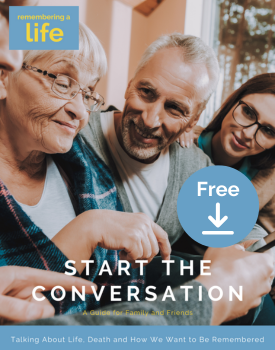
Making it Meaningful
Choosing a Location
In selecting a venue for your loved one’s service, you have a unique opportunity to choose a site that reflects the individual’s spiritual beliefs, favorite hobbies, or interests. Reflect on where your loved one enjoyed spending time and consider having the service at a favorite restaurant, botanical garden, park, or art gallery. If your loved one was a member of a church and sang in the choir, a church, with the choir singing a tribute, would be a wonderful setting. If he or she loved the outdoors, a local park would be a nice option. Keep in mind that your local funeral home can help you transform a visitation room at the funeral home to create an event that beautifully pays tribute to your loved one and showcases his or her interests and hobbies. Ultimately, it is important to choose a site that you feel will offer a comfortable setting in which to welcome guests and help them begin the grieving process.
Your funeral director can assist you in arranging specific details with venue coordinators. You will be asked about details such as seating, technology needs and catering options. It is possible your funeral director already partners with some local venues exclusively in providing memorable life tribute events, so discuss your ideas with your funeral director prior to contacting a venue directly.
Choosing an Officiant
An officiant can make a service meaningful by talking about the individual’s life; sharing anecdotes and special memories; and perhaps even encouraging attendees to share stories about the person who has died. An officiant could be a member of the faith community, a celebrant, or even a family member or friend.
An officiant who knew the person will be able to include a personal perspective based on their own interactions with the deceased; however, it is not necessary for the officiant to have had a personal connection with the person who has died. Celebrants, for example, will meet with family and friends in advance to learn more about the person who has died so they can learn more about their life, special memories and meaningful stories. This meeting also provides you with the opportunity to share details such as whether a specific faith tradition should be focused on, or no faith tradition at all.
Personalization
The funeral, while serving to help you acknowledge your loss, also serves as an opportunity to recognize and honor that which made your loved one special. Contemporary thought, as it relates to funerals, incorporates not only a person’s religious tradition, if any, but also allows you to remember your loved one’s hobbies, interests, or certain qualities, which made them like no other person.
If you have attended a funeral recently, you may have seen a collage of photographs, a memorial video tribute, personal items of the deceased on display, special mementos, storytelling from close friends or family, special life tribute ceremonies, balloon releases or any other number of unique tributes. All of this is done to help make the funeral more personal, to illustrate that, which was unique about the person’s life, and to help those who have lost someone special begin to heal.
To help you begin the process of planning a unique tribute, think of your answers to the following questions:
- What could your loved one do better than anyone else?
- When you think of your loved one, what do you think of?
- What were your loved one’s hobbies or special interests?
- What were some of your fondest memories of your loved one?
- What was your loved one passionate about?
- What was your loved one's faith or spiritual belief?
The answers to these or similar questions will help you pinpoint those qualities and activities that are most identifiable with your loved one. Your NFDA funeral director can help guide you in this process or share ideas and make recommendations to help you plan a special and fitting tribute.
A memorable life tribute event should be as unique as the life your loved one lived. It can be as elaborate or simple as your family wishes. As you reflect about your loved one, think about their personality, what made him or her special and the memories you will cherish forever. When discussing elements of personalization for your loved one’s tribute, think in terms of capturing the essence of their life. Through music, ritual, storytelling, vignettes and refreshments you are able to share the person’s life story in very meaningful ways.
The funeral home you select is committed to providing an event as unique as your loved one’s life. It is not uncommon for families to say they prefer a party over a funeral or wish to have their event unlike any other funeral they have attended in the past. A licensed funeral director will explore simple to more elaborate choices for personalization.
Consider just a few of the things that can make a funeral unique and personal:
Meaningful Displays - Was dad a bowler? A display of his bowling gear and trophies will honor his love of the sport.
Memory Gathering/Storytelling - Place memory jars throughout the venue and invite people to write a memory on a piece of paper and put it in the jar. These memories can then be read by family and friends after the service. (Any jars will do, or you can use the Remembering A Life Memory Jar.) Or, invite people to share stories with those in attendance.
Distinctive Scents - If mom loved to bake, have some freshly baked cookies at the service. The aroma will bring back fond memories for many in attendance.
Unique Keepsakes - If your loved one was the family photographer, create a keepsake (ornament or other small token) featuring his or her favorite photo.
Special Participation - Did your sister sing in the church choir? Invite the choir to sing one of her favorite songs at the service.
Food/Beverage - Did your brother love going to the ballpark? Serve ballpark-inspired snacks and refreshments during or after the service.
Live Music - Did grandpa play in a band in his younger years? Honor that with live music after the service.
Customized Menu - Did Uncle Bill love to cook? Ask the caterer to prepare some of his favorite foods for the lunch.
Floral Arrangements - If grandma loved to garden, feature floral arrangements of flowers she loved.
Photography - Guests enjoy seeing photos that reflect the individual’s life and the other people who were important to them throughout all stages of life. Photos can be gathered and taped to poster board, which are then displayed on easels, or create a digital display of photos that can be displayed on a monitor throughout the visitation.
Transportation - If grandpa was an antique car enthusiast, consider renting an antique car to escort the hearse to the cemetery.
Eulogy Writing - Personal tributes during a service can be exceptionally moving and give attendees insight into the individual’s life.
Service Program, Memorial Cards and Donations
If you are having a formal service, a service program is nice to provide to your guests. The program can feature the order of service, printed song lyrics to be sung during the service, a short biography of your loved one and some of his or her favorite quotes. Following the service, the program is a nice keepsake for your guests.
Some families also create memorial cards to make available to guests. Memorial cards feature the name of the individual and his or her dates of birth and death. The card often also features a favorite religious passage or quote.
Your funeral director can help you make selections for these and other printed materials to use at the service.
While in the past it was common for people to send flowers to a funeral, increasingly, families are requesting donations be made to an organization that had special meaning to their loved one or the family. For example, if a person died of cancer, the family may request donations be made to a cancer research organization. Or if a loved one volunteered at the local animal shelter,, donations may be requested for that organization. Many organizations will have donation envelopes and will provide you with a supply to make available at the service. Discuss this option with your funeral director.
Family and Friends Reception
Time for socializing after the funeral provides family and other loved ones with a transition from what can be a somewhat surreal experience of a funeral back into the “real world.” Often, a lunch or dinner will be held after the funeral, giving guests the opportunity to enjoy refreshments while continuing to reflect on the life of the deceased and offer support to the family and other loved ones.
Keepsakes and Mementos
There are many keepsakes available that help you create a lasting memento of your loved one, from jewelry to boxes. If you are interested in learning more, your funeral director can tell you about the various options.
